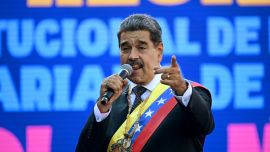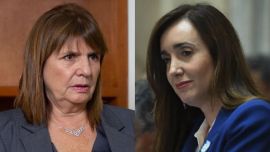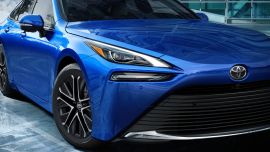Venezuelan President Nicolás Maduro was sworn in for a third term Friday in a ceremony decried as illegitimate by the opposition and internationally, with Washington offering a US$25-million reward for his arrest.
A defiant Maduro, 62, adorned with an oversized yellow, blue and red presidential sash, shrugged off the outcry over his unproven claim to have won another six-year term, saying that his investiture was a "great victory for Venezuelan democracy."
His challenger in July's election, Edmundo González Urrutia, recognised by the United States and much of Latin America as the legitimate winner, said Maduro had "crowned himself a dictator" and staged a "coup."
Washington and London issued a bevy of sanctions on Maduro's regime, with US Secretary of State Antony Blinken slamming the inauguration as "illegitimate."
In a sign of Maduro's isolation, only two prominent regional leaders – Cuban President Miguel Díaz-Canel and Nicaraguan ex-guerrilla Daniel Ortega – attended his inauguration.
Russian President Vladimir Putin congratulated Maduro on his swearing-in, according to the lower house of parliament.
Lower house speaker Vyacheslav Volodin, who attended Maduro's inauguration in Caracas on behalf of Putin, "conveyed congratulations from Russia's head of state", it said in a statement.
Traditional left-wing allies, including Brazilian President Luiz Inacio Lula da Silva, pointedly stayed away from the ceremony.
In a statement, Argentina's President Javier Milei condemned the "criminal Chavista regime" led by Maduro, branding it "one of the worst dictatorships in history."
The opposition says its tally of results from the July vote showed a clear victory for its candidate, 75-year-old González Urrutia, who went into exile in Spain in September after a crackdown on dissent.
The retired diplomat, who stood in at the last minute for opposition leader María Corina Machado after she was disqualified by courts loyal to Maduro, had voiced a vague plan to fly home to take up office on Friday.
In a video after Maduro's inauguration, he vowed to return "very soon" to "end this tragedy."
'Has Edmundo arrived?'
The United States increased to US$25 million a reward for information leading to the arrest of Maduro or Interior Minister Diosdado Cabello, and added a new US$15-million reward for Defence Minister Vladimir Padrino López.
All three rewards relate to US narco-trafficking charges dating to 2020, two years after Maduro's first re-election in a vote also tainted by fraud allegations.
His third term could see him remain in office until 2033, four years more than his mentor, the late socialist firebrand Hugo Chávez.
US Secretary of State Blinken said in a statement that Maduro "clearly lost" last year's election and called the swearing-in ceremony "an illegitimate presidential inauguration."
In a separate announcement, the US Treasury Department said it was sanctioning eight senior officials who lead "key economic and security agencies enabling Nicolas Maduro's repression and subversion of democracy in Venezuela."
On Thursday, incoming US president Donald Trump defended Venezuela's opposition party leader and its exiled presidential candidate as "freedom fighters."
After taking the oath of office before parliament, he poked fun at González Urrutia.
"Has Edmundo arrived?" Maduro asked in mock surprise after hearing a noise among the crowd while speaking from the podium.
Opposition defiance
Maduro, a former bus driver and trade unionist, has clung to power for over a decade through a mix of populism and repression, even as the United States imposed punishing sanctions on the key oil sector and the economy imploded.
Machado, a hugely popular figure, sought to keep the opposition fires burning on Thursday by emerging from hiding to address thousands of protesters on the streets of Caracas.
"We are not afraid," she declared, alluding to the government's crackdown on protests after the July election and a new wave of arrests of opponents and critics this week.
She was briefly detained after her address in circumstances that remain unclear.
At least 17 other protesters were also detained, according to the rights NGO Foro Penal.
Maduro had sent thousands of police and soldiers onto the streets in recent days, sparking fears of bloodshed.
More than 2,400 people were arrested, 28 killed and about 200 injured in the protests that erupted after he was proclaimed the winner of July's election.
UN chief António Guterres called Friday for Venezuelan authorities to release all those who have been "arbitrarily detained" since the elections.
"The Secretary-General strongly condemns the detention of a large number of persons, including opposition figures, journalists and human rights defenders since the July 28 presidential elections," spokesman Stephane Dujarric told reporters.
Waiting for Trump
The opposition is now waiting to see how US President-elect Donald Trump will handle Maduro on his return to the White House later this month.
During his first term, Trump took a hardline stance on Venezuela, imposing sanctions on the country's crucial oil sector and recognising a parallel, opposition-led government that later collapsed.
The sanctions Trump imposed were partly lifted, then reimposed, by his successor Joe Biden.
The EU said Friday that Maduro was not Venezuela's legitimate president.
Foreign policy chief Kaja Kallas said "Maduro lacks all democratic legitimacy," as Brussels announced sanctions on a further 15 officials from Venezuela's National Electoral Council, judiciary and security forces.
UK Foreign Secretary David Lammy said Maduro's "claim to power is fraudulent," as London also announced further sanctions on individuals associated with the Caracas government.
"The outcome of July's elections was neither free nor fair and his regime does not represent the will of the Venezuelan people," Lammy said.
Phil Gunson, a Venezuela expert at the International Crisis Group think tank, said he believed Maduro wanted to reach a deal with Trump on lifting sanctions.
"It would be about oil, it would be about migration. And it would, I think, in the case of a Trump administration, be much less about democracy and human rights," Gunson told AFP.
























Comments